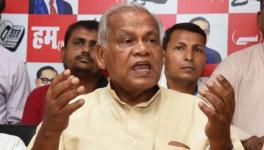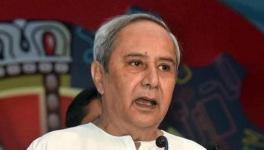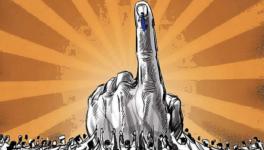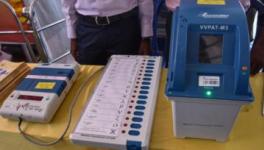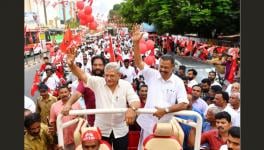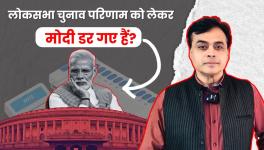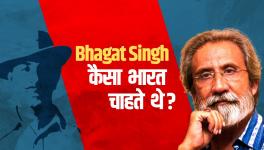'AIBEA demands CBI Enquiry'- Venkatachalam
Newsclick spoke to Mr. Ch. Venkatachalam, Gen. Sec., AIBEA, on Demonetisation. Mr. Vekatachalm criticised that demonetisation is an ill planned and shoddy exercise. According to him, not only has the demonetisation inconvenienced people, but negatively affected the banks' balance sheets. In his view the hype of cashless economy is a going to fall flat as India does not have the necessary digital security infrastructure that is needed for card payments. He demanded that center should call for a CBI enquiry on the large quantities on new currency notes found with black money hoarders.
Rough Transcript:
Bodapati Srujana (Srujana): Hello and welcome to Newsclick. Today we are going to discuss demonetization and we have with us today Mr. Venkatachalam, General Secretary of AIEBA, All India Employees Banking Association. Sir, RBI has given different figures of demonetization since the day demonetization started and till December 30, it has been giving various figures which do not match with each other. After that, it totally stopped giving figures. We don't know how much of the money has come back into the system. Can you tell us about it?
Ch. Venkatachalam (Venkatachalam): You are right. They have been either avoiding to give figures or they are not informing the people what exactly it is. Now, I think before the parliamentary committee owes to us some 9 lakh crore. But the fact remains that acute shortage of cash in the branches is normally we are getting in the branch before November 8. We don't have that.
Srujana: There is one side the remonetization that people need cash, there is also on the other side the demonetization part. How much of the old currency that RBI has with it now because it has stopped releasing figures. There are various figures been quoted in the press that 97%, 95%. So can you tell us about it?
Venkatachalam: See, they said that the 500 and 1,000 rupee notes that constitute about 85% of total notes printed by them. That is about Rs. 15 lakh crores and now we find that everything has almost come back to the banks. They are saying 96% - 97%. Everything has come to the banks and banks have kept it in the currency chests. So they’re wrong to say that we’re counting, reserve bank did not count. All the 4,000 currency chests are held by the banks on behalf of RBI. The moment I remit to the currency chest ten rupees, online Reserve Bank of India will know that some bank has remitted ten rupees in their account. They know it now. So they are simply duping the people saying we don't know 95-97 percent and the main point is that they said about 5-6 lakh crores will not come back because they are black money. That's not true. The bulk has come already. So where is the black money? That is the objective of the whole demonetization. So the purpose is not served, it is defeated.
Srujana: So do you think that Reserve Bank is deliberately withholding the data?
Venkatachalam: See, it appears, the Reserve Bank is caught in between. The Reserve Bank has to oblige the government. They are no longer independent and whatever government wanted, they are doing. But they are not able to fully justify. Somewhere, they also said that we never wanted demonetization. We have been telling them. That's what the government has decided. I think, unwillingly now RBI has become the villain of the peace.
Srujana: Sir, you also mentioned about the currency chest. We have heard a lot of times in Newspapers that RBI has not kept track of the currency that has gone from currency chest to the bank branches because of which lot of money has been caught. We heard in the news that lot of money has been caught. This money could not be traced to any bank branch because RBI has not kept track. So is that a normal thing or is it something unusual and unique that happened this time.
Venkatachalam: See, the banking system, the banks dispense the cash. Number one, the banks where the customers have their accounts, we accept cheques and give cash. That's one. The second is the currency chest on behalf of the RBI is within the bank. They deal only with the branches. They don't deal with the customers. Whenever, the branches want cash the currency chest of that bank on behalf of RBI will supply cash to the branch. But they are not empowered to dispense cash to any public. The third point is RBI itself. RBI is dealing with the public. RBI is also dealing with the banks. So whenever we want any currency chest wants cash, RBI will give that. There is a fourth element. The ATM filling contractors - that is the new one. So these people can draw money from the bank or they can draw from the RBI. Most of the banks outsource this ATM maintenance. So they simply give a letter. The ATM contractors go to the Reserve Bank of India; they take huge bulk of cash. What do they do with that? They are supposed to keep it inside the ATM. Many ATMs are not working. So they are leaking out the cash. But RBI will now because these are all not small amounts, they are huge amounts 50 crores, 80 crores, 90 crores, 40 crores, like that. So from where the money has gone out, they will easily be able to tell.
Srujana: Sir, there was an argument for the demonetization. The money that comes back from demonetization will help recapitalize the public sector banks. How true is that argument?
Venkatachalam: It is totally wrong. People do not know what recapitalization is. Whenever we do more business, to cover that risk, we need capital and to some extent government is giving. To some extent banks are going public and they are doing. Demonetization money has come in, that has nothing to do. That is illegal money. So the money is with the Reserve Bank of India. Banks have nothing to do with it. Government on its own has to give some more money has capital. That is a different one. But it has nothing to do with demonetization. It is wrong understanding of people.
Srujana: We have heard from the newspapers that credit of take two small scale industries has been affected due to demonetization. So how true is it?
Venkatachalam: It is true partially because there is no demand because of demonetization there is cash shortage. So people have no cash. So naturally, the retail business, small scale industries, and rural sectors, everywhere there is a cash crunch and their business is totally affected. So when there is no money to purchase, the money is with the bank and people are not having money to purchase. So there is no money to purchase, so there is no demand. When there is no demand, they don't know what to do with manufacture. Many factories are going on one shift, instead of two shifts or three shifts. So naturally, they don't need money. What will they do with the money taken from the bank when they can't produce and sell?
Srujana: Sir, in the initial days of demonetization the Prime Minister had declared that demonetization is to fight black money. But later the whole agenda shifted to cashless-ness. That demonetization will bring cashless economy.
Venkatachalam: See, going cashless or digital is a laudable objective anyone can welcome. They don't want to overtake because science and technology can not stopped in any society and India is no exception. So it is okay. But what is the speed. What is the process by which we can achieve that objective? As of now, it is 97% cash driven economy. So we can slowly, slowly increase that digital and reduce cash. But it cannot become zero overnight. Even now, we have Rs. 2.5 crores of credit cards and about Rs. 60 crores of debit cards. The usage is not much; people do not know much there is lot of vulnerability. Three months ago, so many card frauds have taken place with the result that banks had to, some major banks had to withdraw the cards and reissue new ones. So, that risk is there. First you guarantee the safety of use of cards. And from the point of sales, there also there’s some commission involved of somebody. So why should the bank or the consumers lose out? So these are all big issues involved. For example, take Modi government’s “make in India”, but all these swiping machines are produced by some special multinational companies from abroad. Not a single swiping machine is produced in India. So there is a shortage. Without a swiping machine, how will you use your card? It’s not possible. This digital banking, cashless banking is really the afterthought. Because, without envisaging what is going to happen they withdrew cash and now they are not able to pump in enough cash. So, to hide it, they are telling that their purpose was to go for cashless. But originally, when they demonetised they said it is to unearth black money and that was a failure. This will become more cumbersome and create more problems and people are going to find it extremely difficult. India is not right for 100% cashless economy, maybe 5% - 10% more we can try. That too where swiping machines are there, system is ok, all the frauds are prevented, all these things are there.
Srujana: Sir in the context of demonetisation, what are the demands of AIBEA?
Venkatachalam: See, that is why from the beginning, from AIBEA we are being pointing out that this scheme is creating more problems for the banks, for the government, for the people and still the government is trying to avoid or ignore these problems. Now right at the moment we have become fed up because the problems continue. Enough money is not there, there is a huge shortage of cash. Reserve bank is not able to circulate cash to us. So we are suffering, customers are suffering, there is a lot of tension in the branches. At the same time, the impression is getting gathered that the bank employees are responsible for everything. If the money is found outside, let there be a CBI investigation and some people have died, including bank employees also, no compensation for that. Even the employees who work extra night after midnight, banks are not giving any over time. These are all the issues. So on these matters to highlight and draw government’s attention; we have given a call for All India Strike on 7th February. All India Bank Employee Association, All India Bank Officer’s Association, Bank Employees Federation of India, three major unions, we comprise of more than 4 lakh bank employees and officers. We are having a strike on 7th of February so that the government will know, the public will know. People want to know what’s happening otherwise they think that bank employees are the villains. We are there to serve the people but RBI must come clean, it should tell the people what exactly is going on and the government should also consider this. That’s why, that’s our demand now.
Srujana: Thank you for giving us your time. That’s all the time we have for today. Thank you for watching Newsclick.
Disclaimer: Please note that transcripts for Newsclick are typed from a recording of the program. Newsclick cannot guarantee their complete accuracy.
Get the latest reports & analysis with people's perspective on Protests, movements & deep analytical videos, discussions of the current affairs in your Telegram app. Subscribe to NewsClick's Telegram channel & get Real-Time updates on stories, as they get published on our website.









